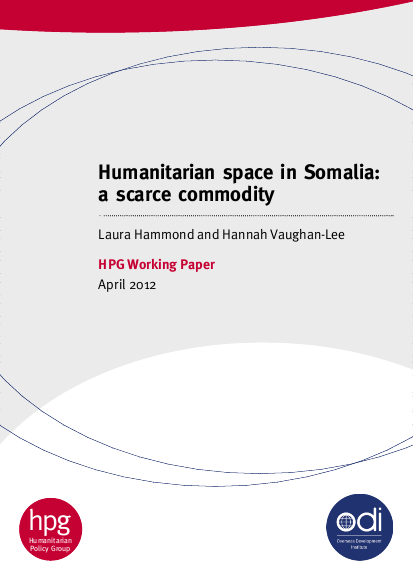
world’s worst and most enduring humanitarian crises; it is also one of the most restrictive and insecure environments for humanitarian actors. In 2011, an estimated four million people were in need of emergency food and medical assistance, of whom only 2.2 million were being reached (OCHA, 2011a). The operating environment presents significant risks to aid workers and communication and coordination between humanitarian organisations and conflict actors is limited. The lack of access to people in need was not only an obstacle to alleviating the extreme food shortages in southern and central Somalia, it contributed directly to causing the crisis. This paper examines the challenges to humanitarian action in Somalia by considering the meaning of the term ‘humanitarian space’ in practice, and the political–humanitarian dynamics within this space. It argues that the political economy of aid –the complex interweaving of legal and illegal business transactions, diversion, taxation, etc., and the power dynamics that govern these activities – has become so entrenched that it has eroded trust between stakeholders and increased insecurity for humanitarian personnel and civilians living in conflict zones, severely constraining humanitarian space. The climate of distrust stemming from the conflation of humanitarian aid and state-building in Somalia has limited principled humanitarian action in many parts of the country. As a result, assistance has been concentrated on areas where access has been possible, and the protection threats facing the most vulnerable civilians have usually not featured as a major concern. The analysis focuses on South and Central Somalia, where conflict, drought, displacement, food price increases and economic collapse have led to extreme food insecurity, and where the conflict has been most violent in recent years.1 In order to understand the current constraints on humanitarian space in South Central Somalia, the paper provides a brief history of the evolution of Western political and humanitarian interests in Somalia since the collapse of the state in 1991. It focuses in more detail on events since 2006, when the political, security and humanitarian context changed dramatically and many of the characters found in today’s political economy drama emerged. Central to this history of constricted and shrinking space is the build-up of mistrust on both sides – with many Somalis doubting the will of international actors to provide help given the failure of political reconciliation efforts (see Hammond et al., 2011; Menkhaus, 2008), and external actors frustrated by the co-option and diversion of international aid into the wartime economy. The paper also considers the evolution of Western donors’ political engagement with Somalia, which has involved shifting mandates and an insistence on state-building, alongside the pursuit of counter-terrorism strategies; there has been little attempt to foster legitimacy or promote dialogue at the community and other local levels. In response to the lack of operational humanitarian space, humanitarian organisations have tried to adapt by using strategies of remote management and developing joint coordination mechanisms and operating procedures and codes of practice. While some of these measures have been useful in maintaining access to areas in need (and in a very few cases expanding this access), aid is still generally provided according to where there is access, and many needy areas lack assistance and protection. This paper argues that, while it may not be possible to fully disentangle humanitarian and political interests in the current Somali conflict, humanitarian space can only be enlarged and made more effective by minimising the deliberate use of humanitarian aid for overtly political purposes. This can only be achieved through a better understanding of how the political economy of aid functions and influences humanitarian and political actions. It also requires engaging at the community level with those in positions of legitimate authority, and the protection of individuals and groups involved in these negotiations even where those parties may not be fully supportive of the state-building model being promoted.